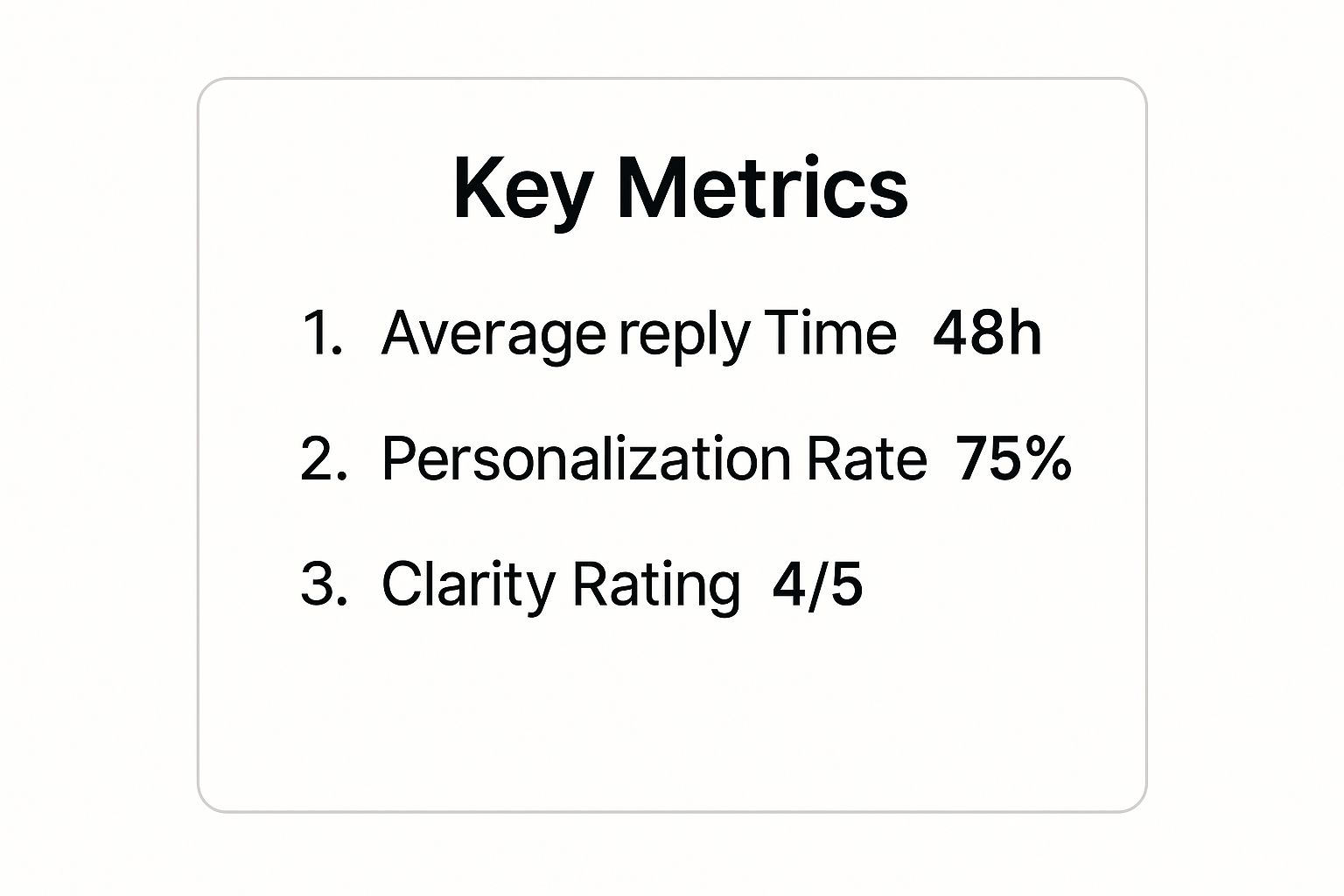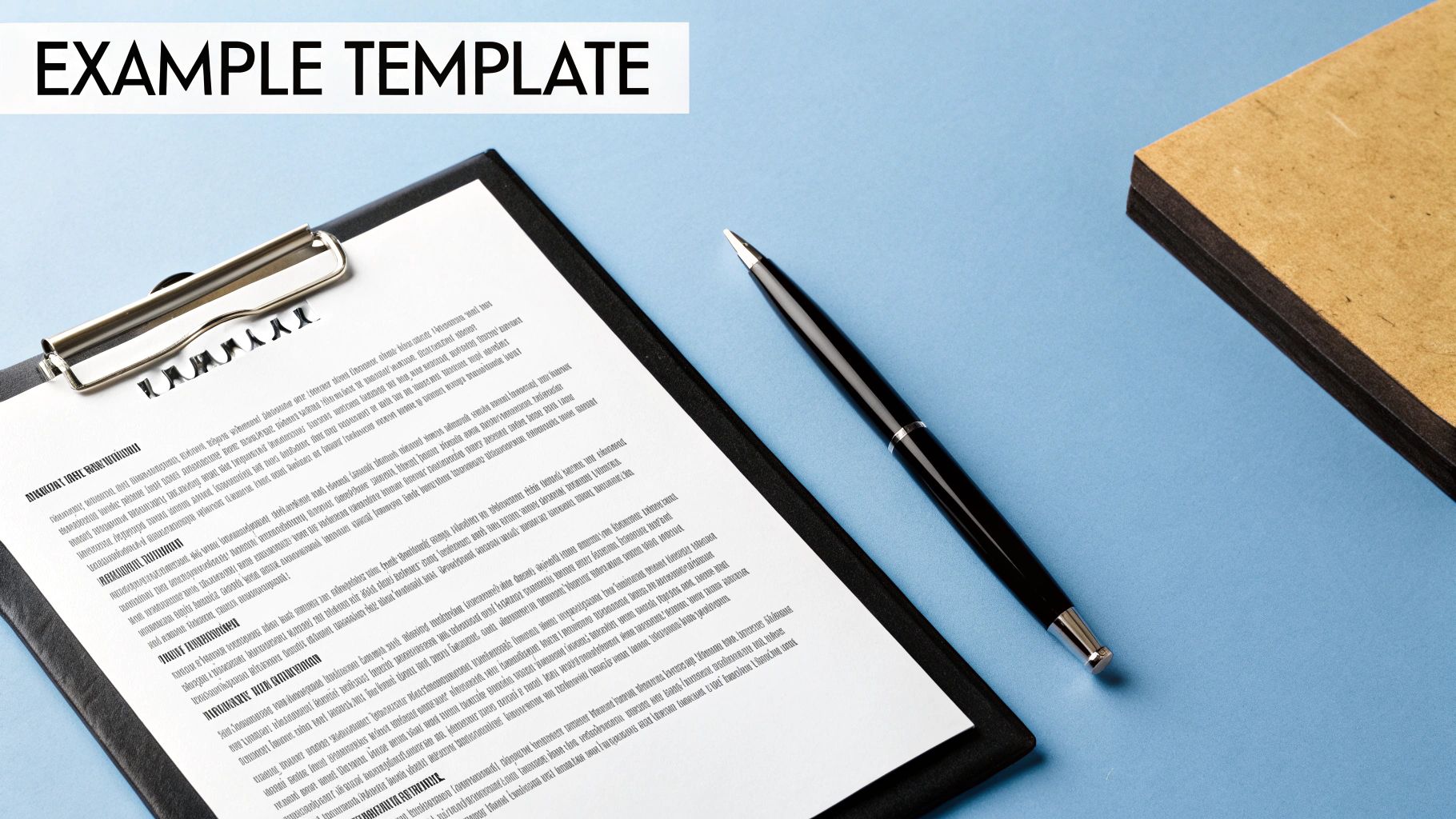How to Write a Polite Job Offer Rejection Letter (Tips & Examples)
- Janis Kolomenskis
- Jul 1
- 10 min read
So, you’ve landed a job offer! That’s fantastic news. But what happens when it’s not the job offer? Turning down an opportunity you've worked hard for can feel awkward, but knowing how to say "no" with grace is a skill that will serve you throughout your career.
A well-written job offer rejection letter is more than just a polite formality. It’s a chance to leave a lasting positive impression, keep professional doors open, and strengthen your network. Think of it less as a rejection and more as a strategic communication that says, "Thanks, but not this time," while preserving a valuable connection for the future.
The Art of Saying "No, Thank You"
The key is to be appreciative and direct. You want to thank the hiring manager for their time and the offer, but be crystal clear about your decision. There's no room for ambiguity here; being wishy-washy only wastes everyone's time and can come across as unprofessional. A prompt, respectful "no" is always better than a delayed, confusing "maybe."
When you're ready to write, focus on a few core ideas to make sure your message hits the right notes.
Act Quickly: As soon as you've made your final decision, let them know. Responding within 24-48 hours is a professional courtesy that hiring managers truly appreciate.
Lead with Gratitude: Always, always start by thanking them. Acknowledge the time they invested in interviewing you and for extending the offer in the first place. It shows you value their effort.
Be Clear and Direct: Don't beat around the bush. State clearly that you are declining the position. Simple, direct language works best.
Stay Positive and Concise: You don't need to write a novel explaining every reason behind your decision. Keep it brief, professional, and maintain a positive tone from start to finish.
This visual breakdown really drives home the best practices for a professional rejection.

As you can see, the data backs it up: speed, clarity, and a personal touch are what make a rejection letter effective. When you follow these guidelines, you're not just declining a job; you're demonstrating the kind of professionalism and respect that people remember.
Job Offer Rejection Do's and Don'ts
To make it even simpler, here’s a quick-glance table to help you nail your rejection letter every time.
Following these simple rules ensures you handle the situation with poise and professionalism, leaving a great impression even as you walk away.
Anatomy of the Perfect Rejection Letter

So, what actually goes into a truly great job offer rejection letter? Let’s move past the cookie-cutter templates and get into what makes a rejection message feel genuine, respectful, and memorable for all the right reasons.
Think of it less as a formal document and more as a professional courtesy. The structure is pretty straightforward, but each part plays a crucial role in keeping that professional relationship intact. It all kicks off with a subject line that gets straight to the point.
Starting With Gratitude
First things first, always lead with a sincere thank you. This opening sets the tone for the entire message. You need to express genuine appreciation for the offer itself and for the time the hiring manager and team invested in you. Remember, they went through the whole process with you, and acknowledging their effort is a mark of true professionalism.
This isn't just about good manners. It’s about affirming their choice to offer you the job in the first place. A warm, appreciative opening makes the "no" that follows much easier to deliver and for them to receive.
Key Insight: A rejection letter is a direct reflection of your professional character. Kicking things off with grace shows you value relationships, and that's a quality hiring managers will remember long after they've filled the role.
The Clear and Kind Decision
Once you've expressed your thanks, it’s time to state your decision clearly. You want to be direct without being cold or blunt. Forget stiff, overly formal language; just be clear to avoid any mix-ups. A simple, straightforward sentence is perfect.
For example, something like, "After giving it careful thought, I've decided to decline your generous offer," works brilliantly. It’s respectful, unambiguous, and lets the recruiter know they can move on. For more real-world examples, you can find a ton of inspiration in our guide to pro email templates that work for any scenario.
Providing a Brief Reason
This next part is optional, but it’s often a welcome touch. If you decide to explain why you're declining, keep it short, sweet, and positive. The key is to frame your reason around your own career path, not any perceived flaws with the company or the offer.
A fantastic way to handle this is to mention that you've accepted another role that’s a better fit for your long-term goals or offers a specific skill you're eager to develop. This approach keeps the focus squarely on your professional journey.
Giving a reason is also becoming a bigger deal in the hiring world. For instance, in Latvia, new legislation coming in 2025 will require employers to document solid reasons for rejecting candidates. This points to a wider shift towards more transparency in recruiting, a trend you can read more about on Fragomen.com.
Rejection Letter Examples for Any Situation

Alright, theory is one thing, but seeing how it works in the real world is where the magic happens. Let's get practical and look at some examples you can actually use for your job offer rejection letter. Every situation is a little different, so I've put together some samples for the most common scenarios you're likely to face.
Think of these less as rigid templates and more as starting points. They’re designed to give you natural, respectful phrasing that you can confidently tweak to fit your own voice. The real goal here is to show you why certain approaches work so well.
You’ve Accepted Another Offer
This is a great problem to have! It does, however, require a delicate touch. You want to convey your excitement for the new role without making the company you’re rejecting feel like a second choice. It’s all about diplomacy.
Here’s a solid way to frame it:
Subject: Job Offer – [Your Name] – [Job Title]
Body: Dear [Hiring Manager's Name], Thank you so much for offering me the [Job Title] position. I genuinely enjoyed our conversations and learning more about the incredible work you're all doing at [Company Name]. After giving it a lot of thought, I’ve decided to accept another role that I feel is a slightly better match for my long-term career goals. This was a really tough decision, as I was so impressed with the team and the opportunity you presented. I truly appreciate you taking the time to meet with me and wish you the very best in finding a fantastic candidate for the role. Best regards, [Your Name]
What makes this work? It’s grateful, direct, and puts the focus on your personal career journey. This keeps the entire interaction positive and leaves the door wide open for crossing paths again in the future.
My Pro Tip: A little specificity goes a long way. Mentioning something you genuinely liked makes your email feel more authentic. For instance: "I especially enjoyed our chat about the upcoming expansion into [Project Area]." It proves you were paying attention.
The Salary Isn’t the Right Fit
Money talk can feel a bit awkward, but it's a non-negotiable part of the deal. When the numbers just don't add up, you can decline politely while still showing you value the offer and their time.
Here are a couple of phrases you could use:
Be gracious but firm: "Thank you again for this generous offer. After reviewing the full compensation package, I've decided to decline, as it doesn't quite align with my salary expectations at this stage of my career."
Reiterate your appreciation: "I do want to say again how much I enjoyed speaking with the team and learning about [Company Name]'s mission."
This approach is honest without being blunt or sounding ungrateful. You’re clearly stating your reason without burning a single bridge, which is absolutely crucial for protecting your professional reputation. Taking the time to craft a thoughtful job offer rejection letter in this situation speaks volumes about your maturity and professionalism.
Right, let’s get into the really tricky situations. Sometimes, saying "no" to a job offer isn't as simple as it sounds. Certain scenarios require a bit more finesse and careful thought.
Getting these right is about more than just being polite; it’s about smart career management. You want to protect your reputation and keep doors open with people you might work with one day.
Here's my advice on navigating the most common—and most delicate—rejection scenarios I've seen over the years.
Declining an Internal Offer
Turning down a promotion or a new role within your own company? That can feel like tiptoeing through a minefield. You have to see these people every day, so avoiding any awkwardness is paramount.
The key here is to shower them with gratitude while gently reinforcing your commitment to where you are right now. You want to make it clear that your decision isn't a rejection of the company, but a choice about where you can deliver the most value.
Try weaving in phrases like these:
Start with genuine appreciation: "Thank you so much for trusting me with this opportunity for the [New Role Title] position. I was truly honoured you considered me."
Explain your current focus: "After giving it a lot of thought, I've realised my passion and energy are really focused on the goals we're chasing in my current role as [Your Current Title]. I feel I can make the biggest impact for the company right here, for now."
End on a positive, forward-looking note: "I'm genuinely excited about where the company is headed and look forward to continuing to contribute. I'd love to revisit conversations about my growth here in the future."
When You Want to Keep the Door Open for Later
What happens when you love the company, but the role or the timing just isn't a perfect match? This is a golden opportunity. Your rejection letter can actually become a bridge to a future conversation.
Your goal is to decline this specific offer while making it abundantly clear you’d jump at the chance to work with them down the line.
My best advice? Be specific about what impressed you. Was it the brilliant team you met? The company's vision for its new product line? Mentioning these details proves your interest is real. It transforms a standard "no" into a memorable "not right now, but please keep me in mind."
How to Respond to a Counter-Offer
So, you’ve handed in your notice, and suddenly your current boss tables a tempting counter-offer to convince you to stay. It's flattering, but be careful. Statistics consistently show that a huge percentage of people who accept a counter-offer end up leaving within a year anyway. The original reasons for your departure rarely disappear.
If you decide to turn it down, be gracious but firm. Make it clear that your decision wasn't just about the money; it was about the new opportunity and how it aligns with your long-term ambitions.
Thank your manager for their belief in you and for the offer itself, but stick to your decision. It saves you from a much more difficult conversation six months from now when you realise nothing has really changed.
Why a Thoughtful Rejection Letter is a Genius Career Move
Let’s be honest, turning down a job offer can feel awkward. But what if I told you that a well-written rejection letter is actually one of the smartest things you can do for your long-term career? It's not just about saying "no, thanks" — it’s a golden opportunity to leave a fantastic impression.
When you decline an offer with grace and respect, you're not closing a door; you're leaving it wide open for the future. The professional world is smaller than you think. The hiring manager you impress today could be the person with your absolute dream job next year. A classy rejection ensures they’ll remember you for all the right reasons.
It’s All About Building Your Professional Reputation
Think of every interaction you have during a job search as a building block for your personal brand. A considerate, well-crafted rejection letter screams professionalism and integrity. It shows you genuinely value the company's time and effort, transforming what could be a negative moment into a surprisingly positive one.
A great rejection letter doesn’t just preserve a connection—it actively builds your reputation as a top-tier, considerate professional. That’s a powerful asset in any industry.
This is more crucial than ever, especially as job markets get more competitive. Take Latvia, for instance. Projections show that the demand for high-level qualifications is soaring, expected to make up 46.3% of the labour force by 2025. You can dig into the specifics of this trend in this detailed CEDEFOP report. As standards climb, the way you handle every piece of professional communication, rejections included, really makes you stand out from the crowd.
Just like you poured effort into your application, your follow-through is what truly counts. If you want more tips on keeping communications sharp throughout your job search, check out our guide on how a great follow-up email can help you land your dream job.
Frequently Asked Questions About Declining an Offer

Even with the best templates in hand, you might still have a few questions buzzing around. It's totally normal! Let's clear up some of the most common queries I hear from professionals when they're about to turn down a job offer.
Getting these little details right can make all the difference, turning a good rejection into a great one that strengthens your professional network.
Should I Always Give a Reason for Saying No?
You're not obligated to, but I always recommend it. Providing a brief, positive reason for your decision is a fantastic professional touch that shows you're not just firing off a generic "no, thanks." It adds a layer of genuine respect.
You don't need to write a whole essay here. A simple, graceful line does the trick perfectly. Think along these lines:
“After some deep thought, I've decided to accept another opportunity that I feel is a slightly better fit for my long-term career goals.”
See how that frames the decision around your personal journey? It’s professional, polite, and impossible to argue with.
Is It Better to Call or Just Email?
Email is definitely the standard here. It's the undisputed champion for officially declining a job offer because it’s professional and creates a written record for both you and the employer. Plus, it gives you the space to polish your words until they're just right.
Now, if you've built a really strong rapport with the hiring manager, a follow-up phone call can be a fantastic personal touch. But always, always send the email first as your official confirmation.
How Quickly Do I Need to Respond?
Timing is everything in the professional world! You should absolutely aim to send your rejection email within 24-48 hours of making your final decision.
Responding promptly is one of the biggest signs of respect you can show for the hiring manager's time and effort. It allows them to move on and contact their next choice without delay. For more tips on navigating your career journey with finesse, you should definitely explore our guide to LinkedIn job search mastery.

Comments